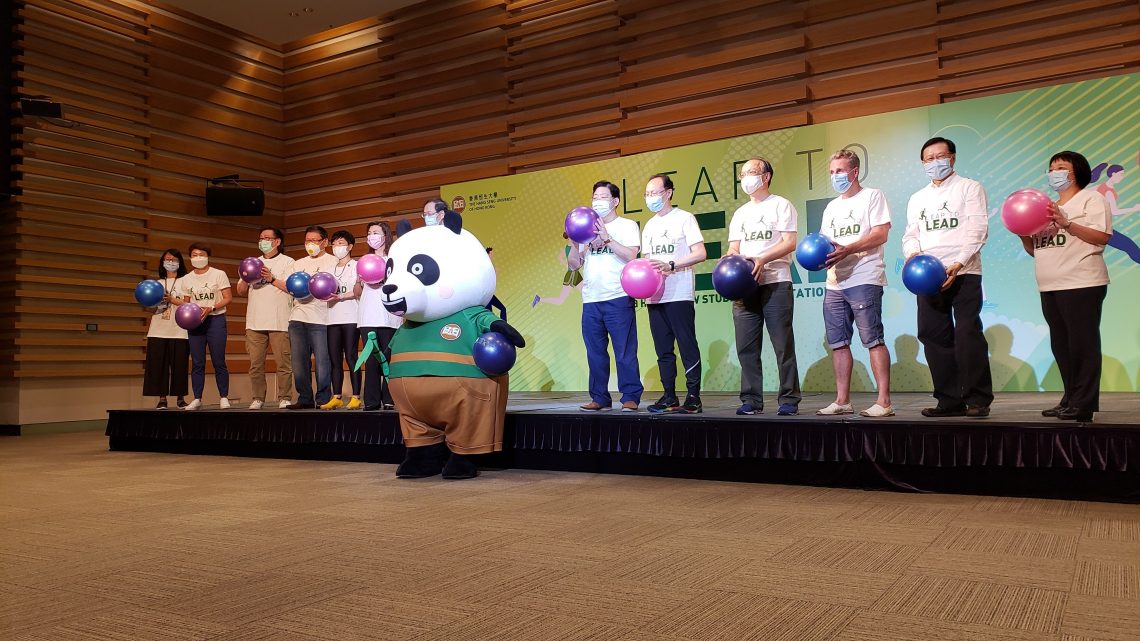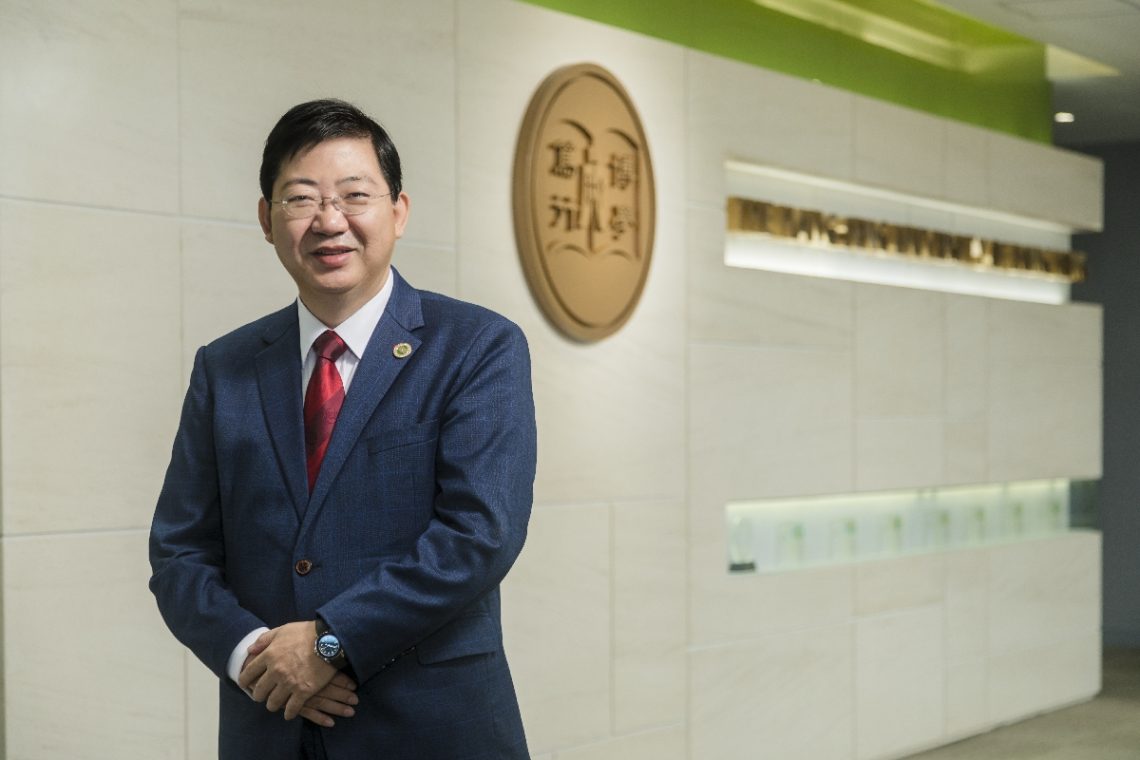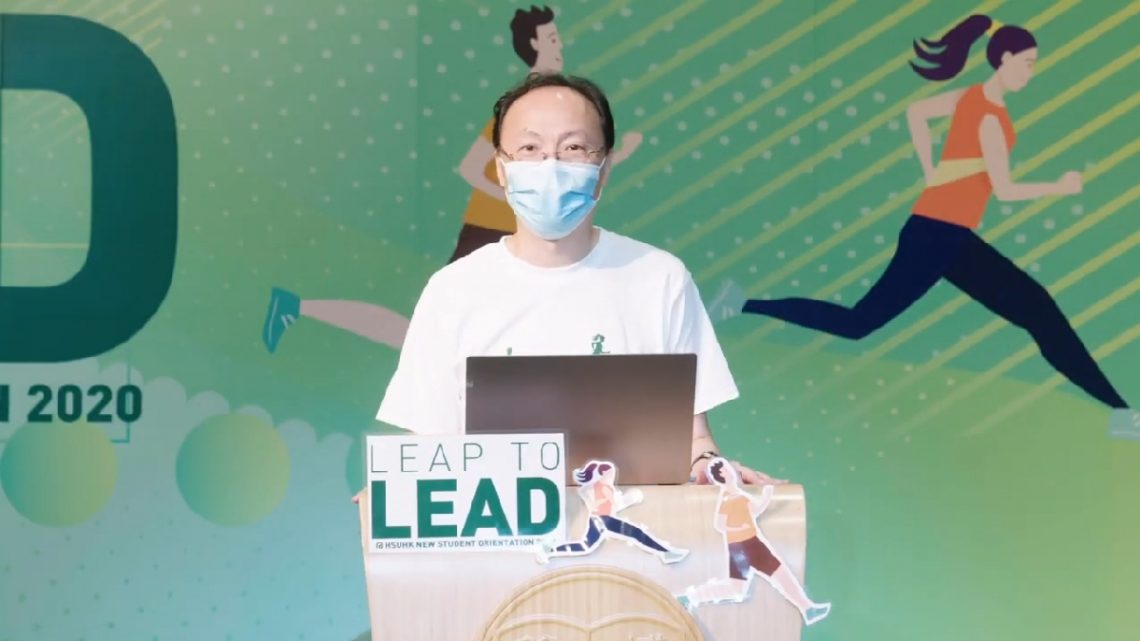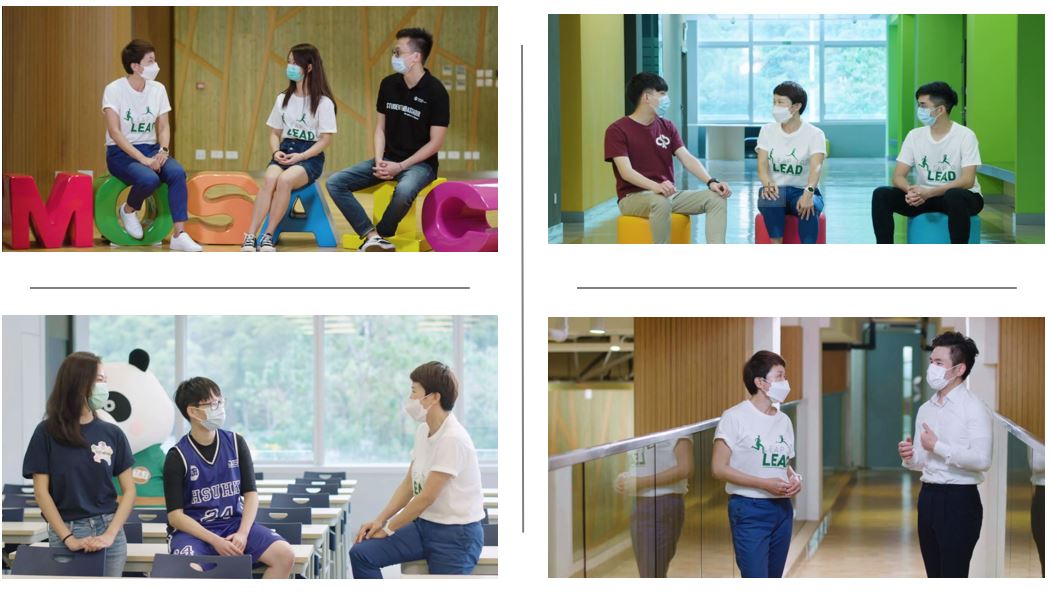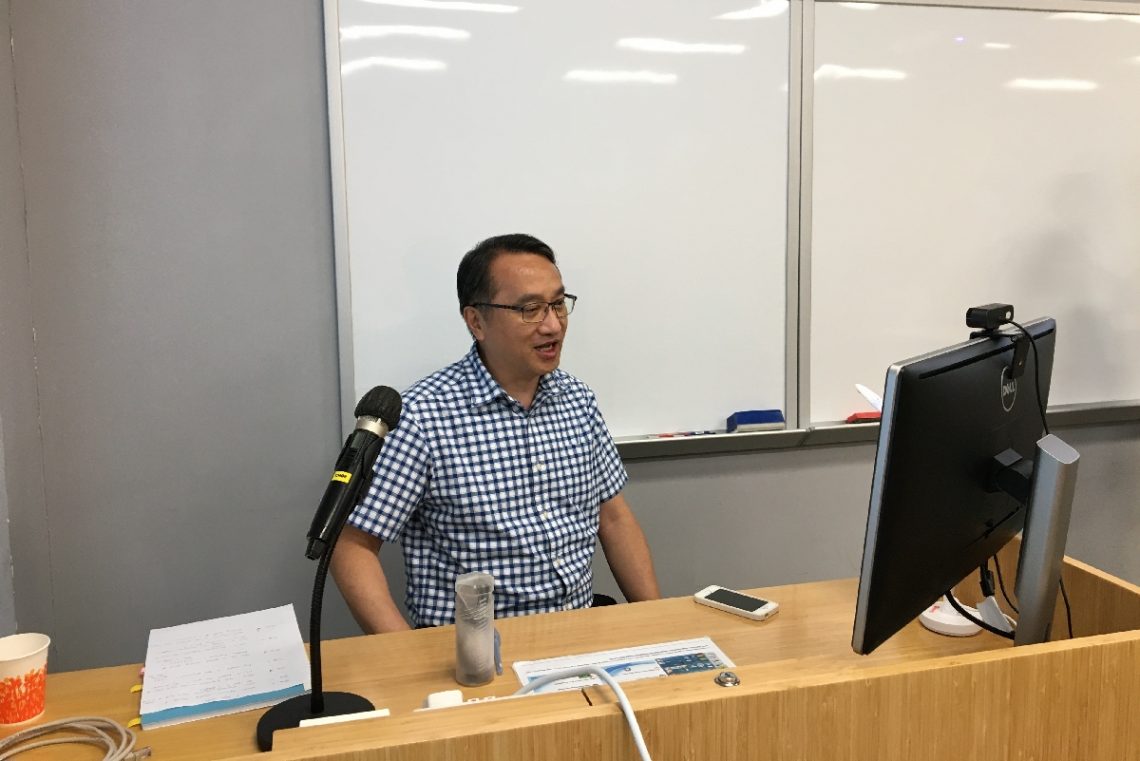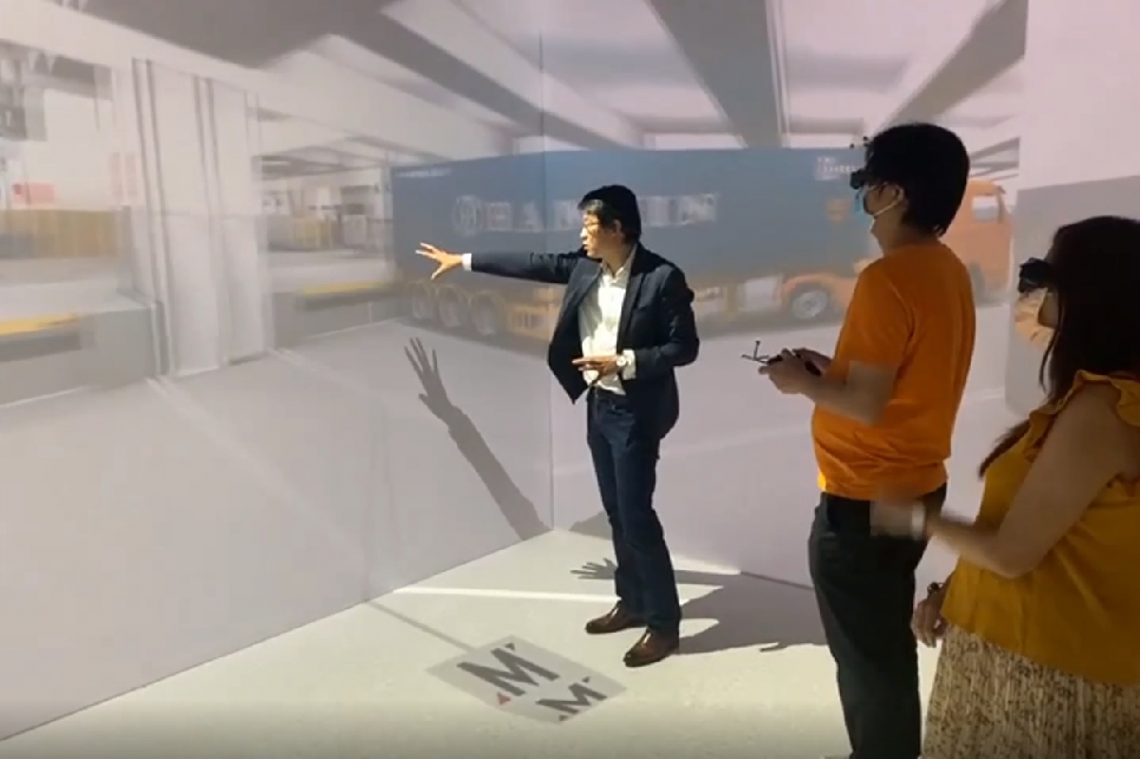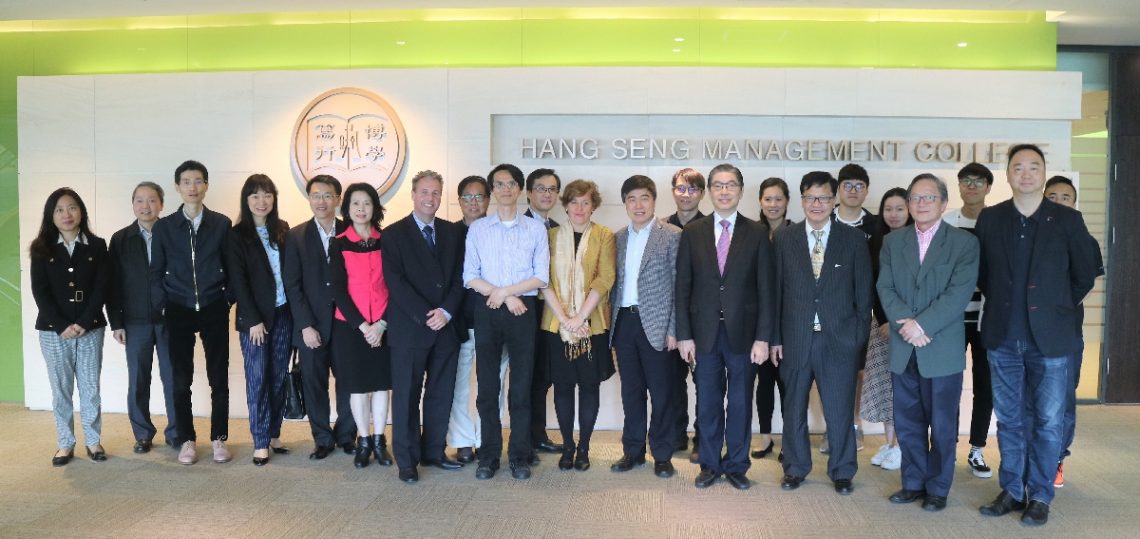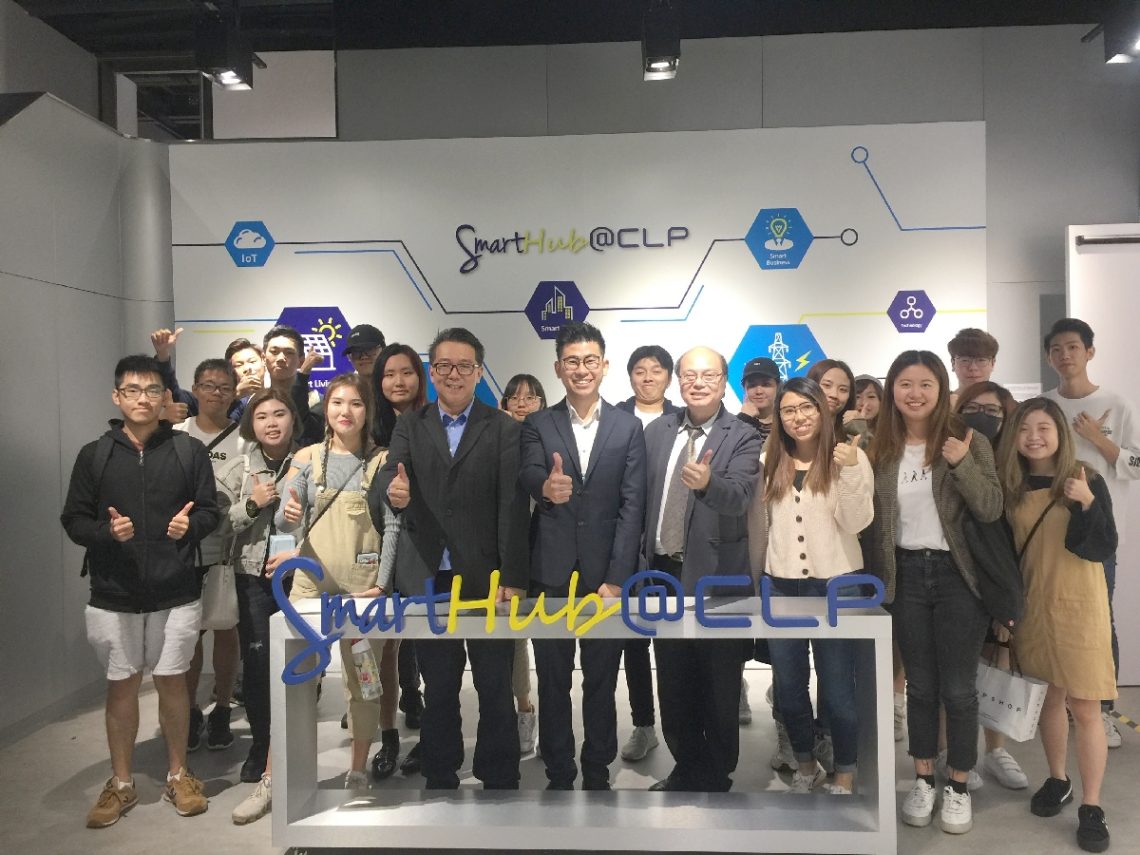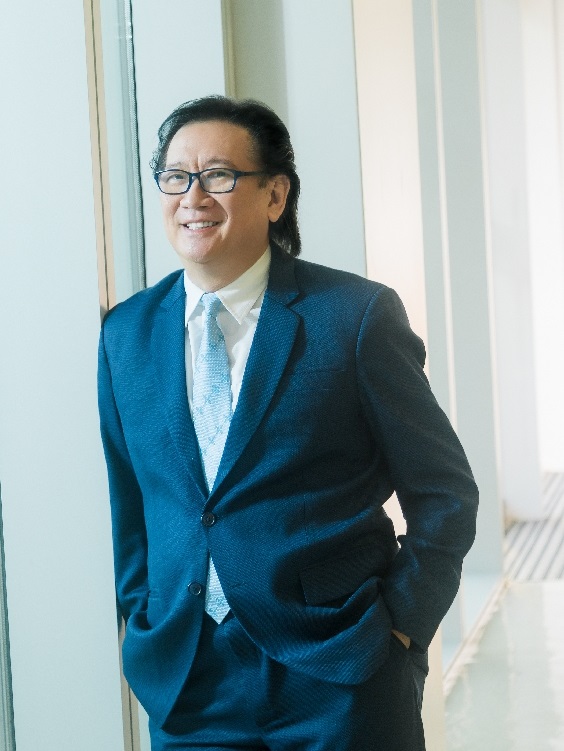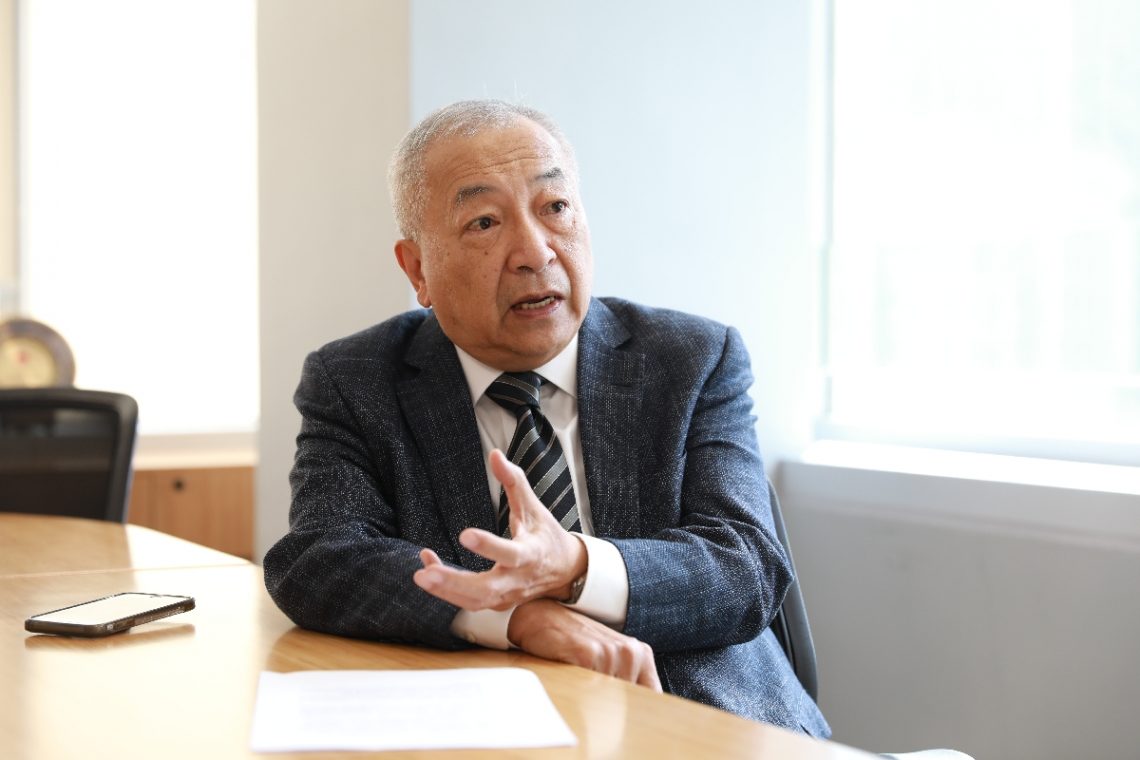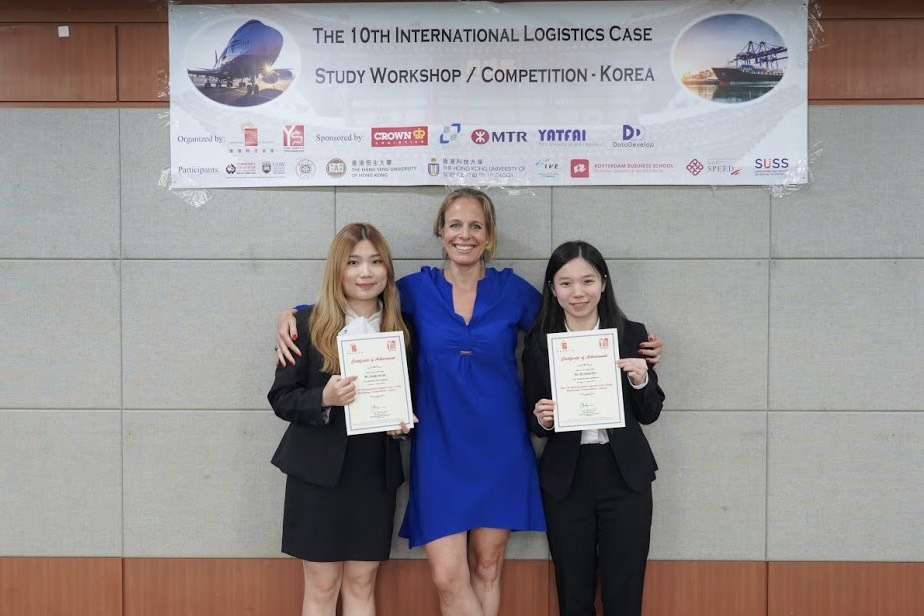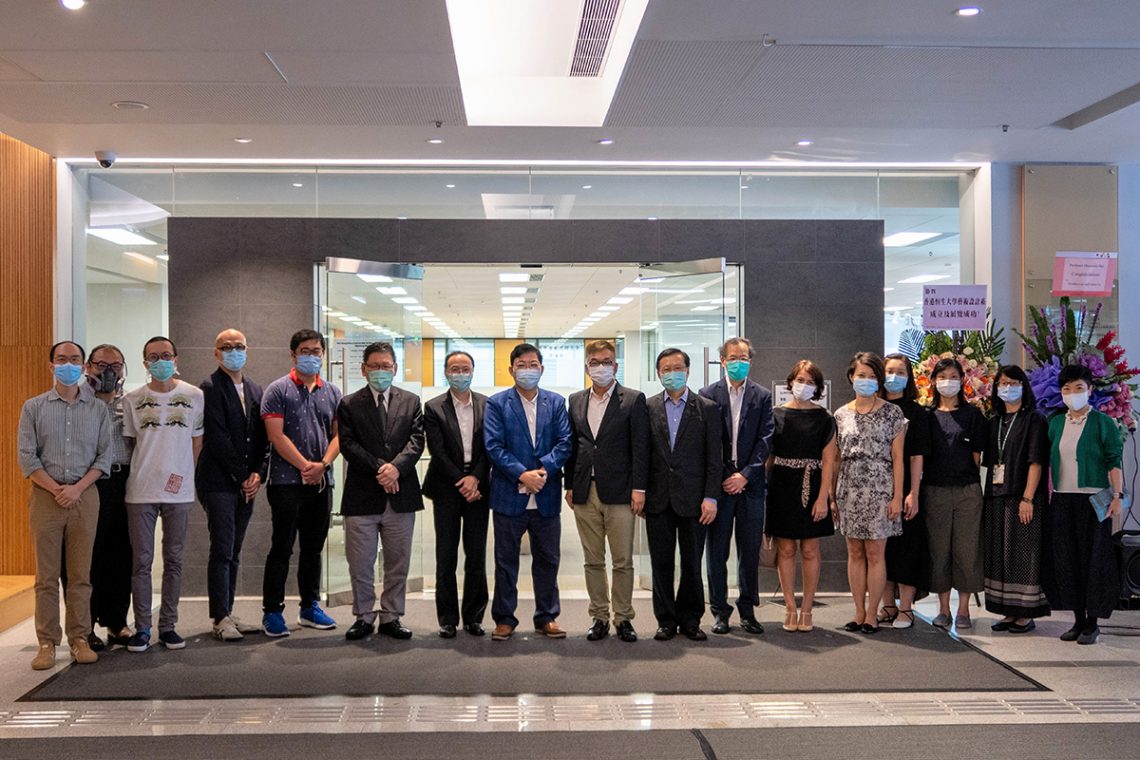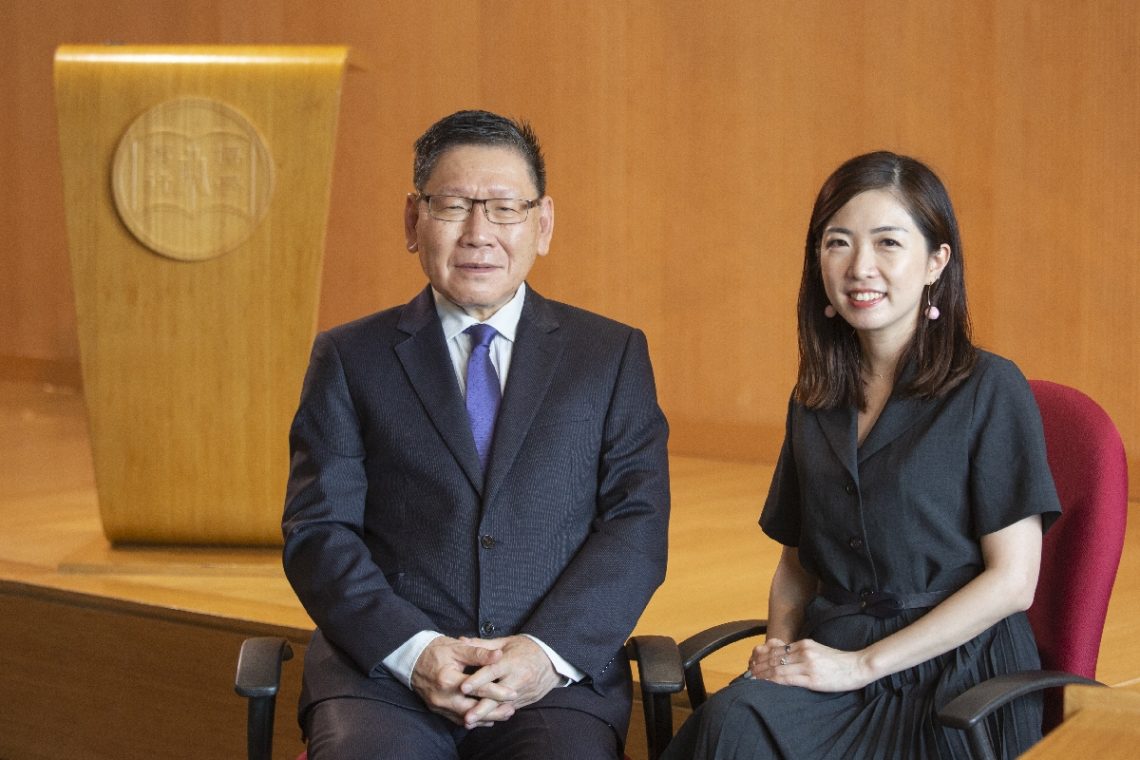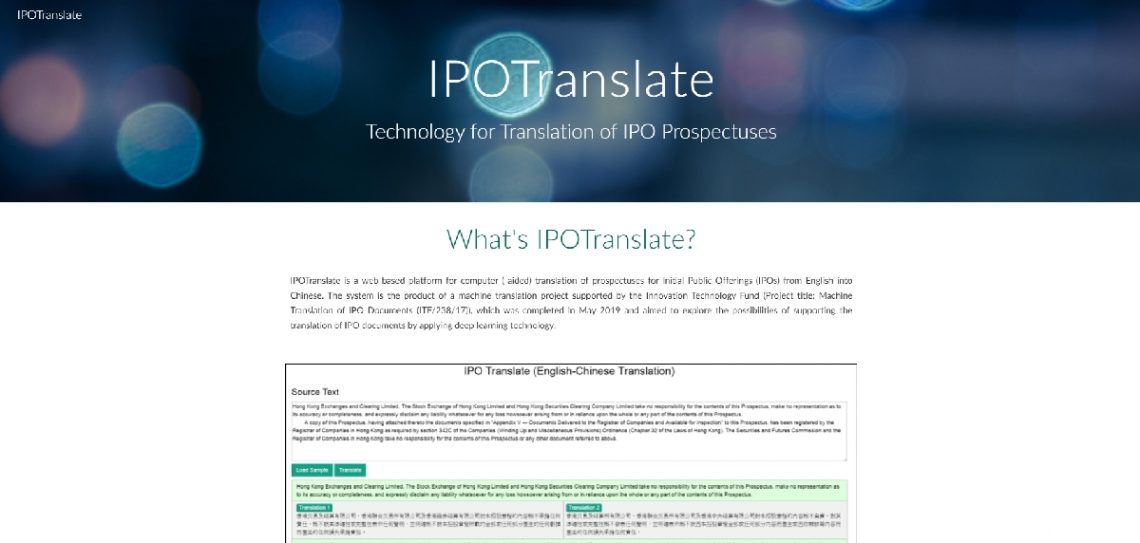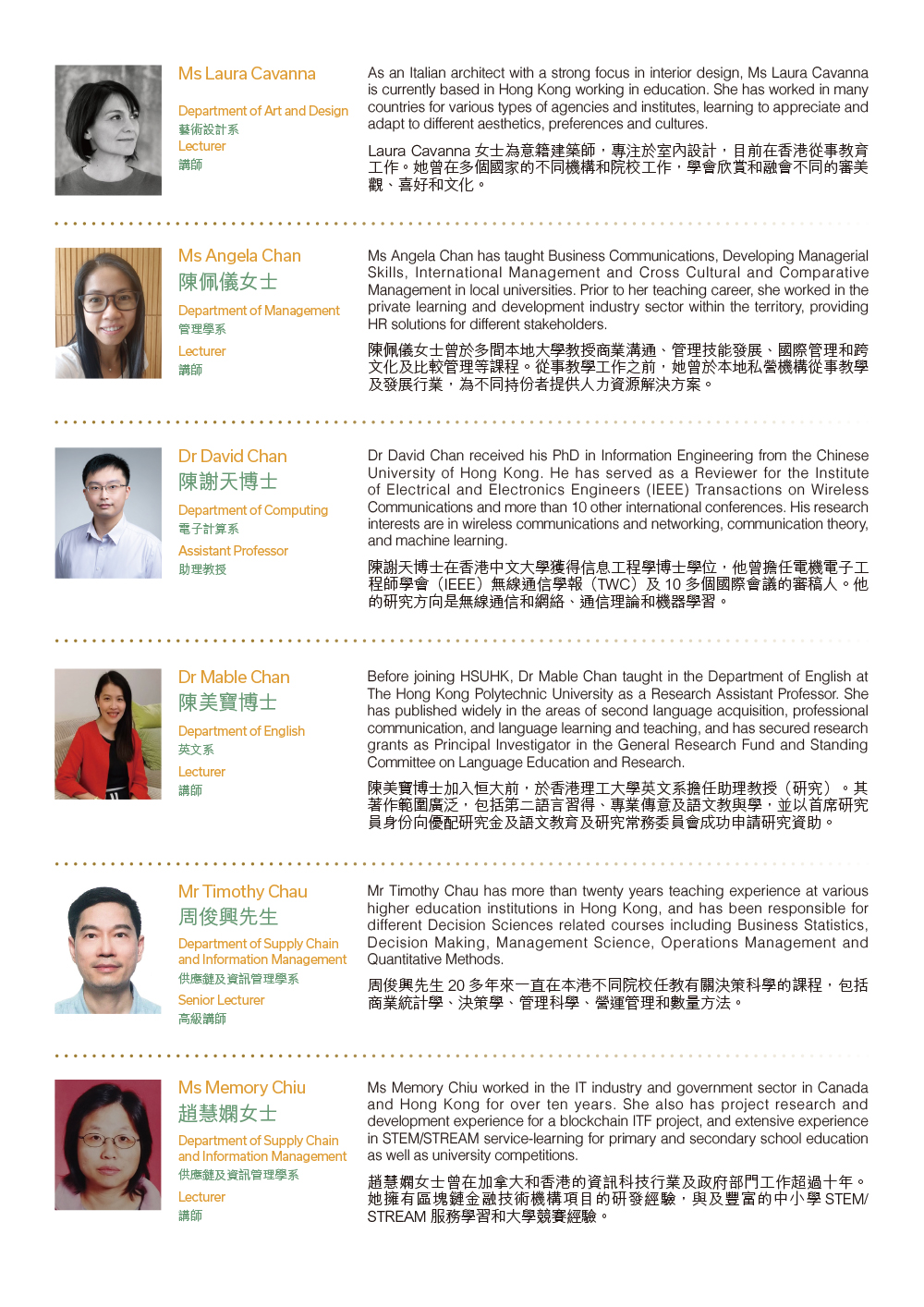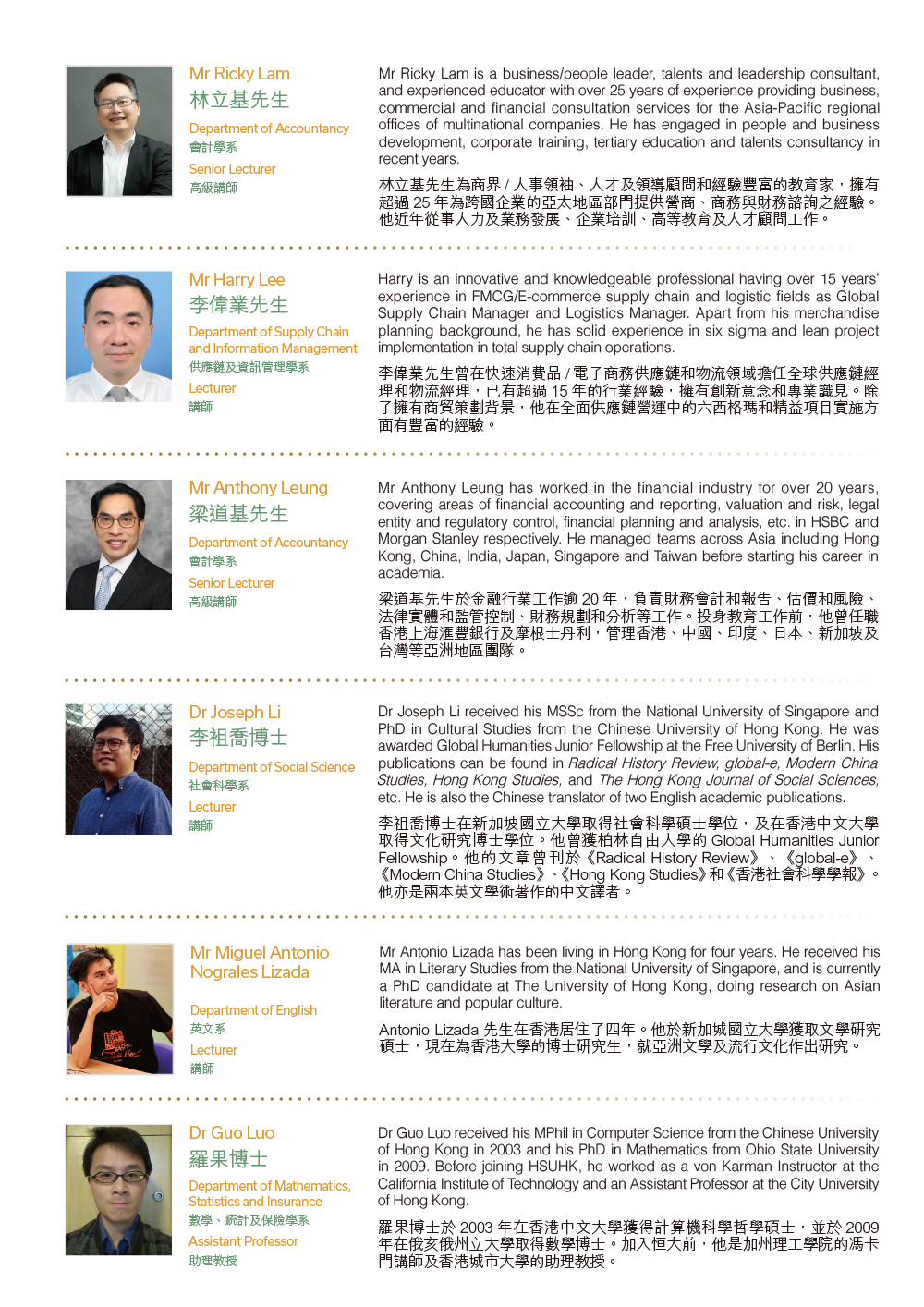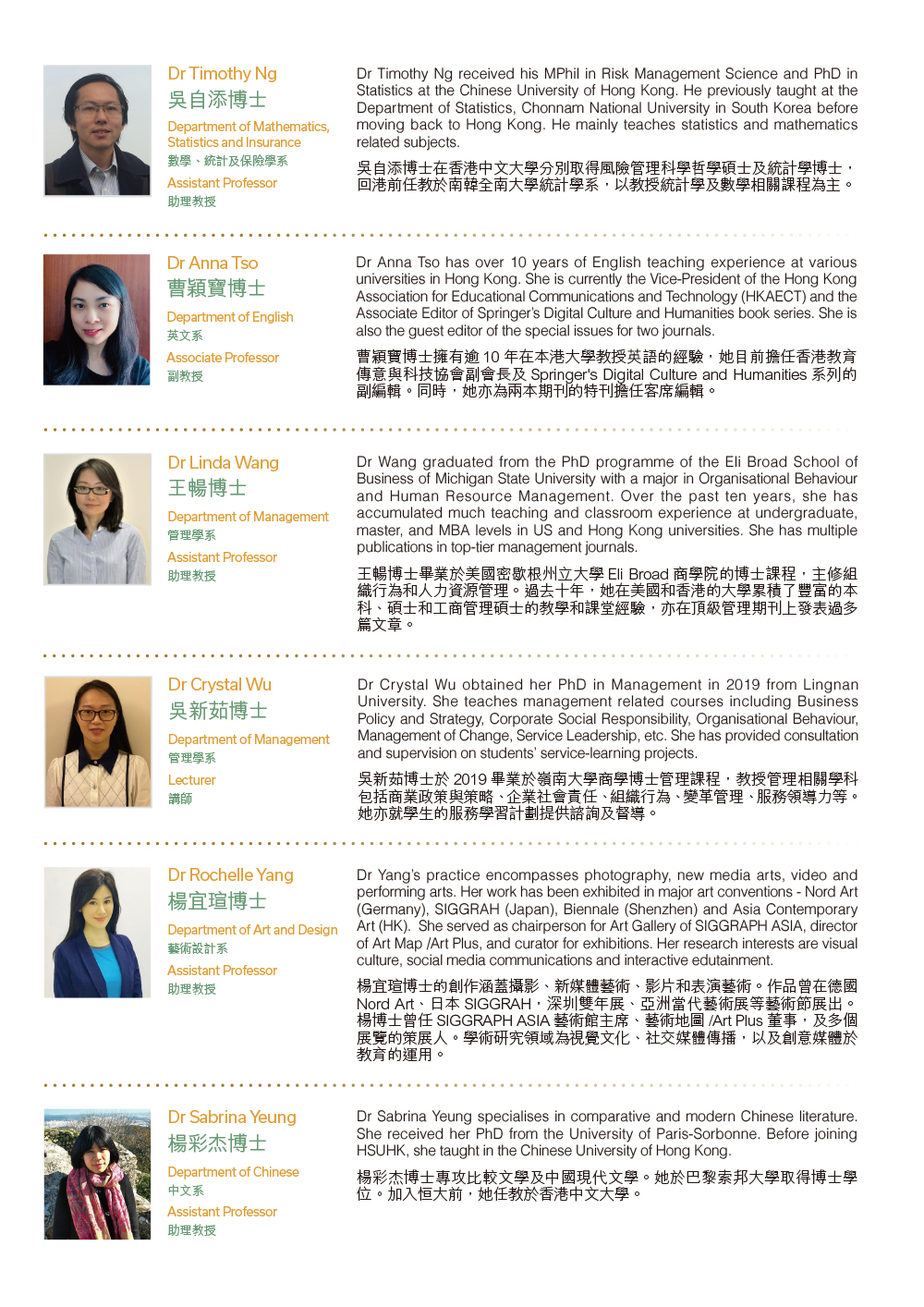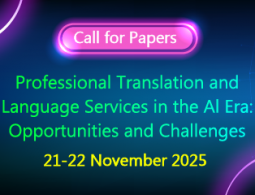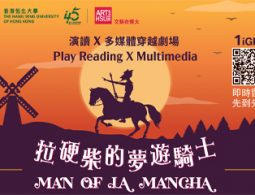The President Welcomes New Members to the HSUHK Family
“My warmest welcome to all of you in the new academic year 2020-21, especially to the new staff members and students who have joined the HSUHK Family!
To the 18 new academic staff members, you have joined a strong cohort of scholars with a common drive to achieve excellence in teaching, learning and research. I encourage you to contribute your expertise and ideas, inspire others and be inspired in this vibrant community.
To the 2,000 new students, having undergone social incidents and the COVID-19 pandemic, we all experienced an extraordinary journey last year, especially for freshmen who overcame a lot of hurdles for the DSE examination. With the start of the new academic year, you have embarked on an exciting learning journey at HSUHK. Here, you will explore your interests and passions, and expand your competencies; you will also be challenged by new ideas and new learning opportunities that will broaden your horizons, help your personal growth and solidify your personal values.
I encourage you to be open-minded, appreciate different ideas and views, and be creative, finding balanced solutions to problems. I hope that students would care more about the people around us, building a community with mutual trust and human caring. If you come across any difficulties or any problems fitting in with the campus life, please feel free to ask senior students or teachers for advice. I believe they will be glad to provide assistance.
Out of adversity comes opportunity. Though there are many challenges ahead, I believe that with perseverance and a positive attitude, we will surmount each hurdle and have a fruitful and flourishing university life.”
HSUHK New Student Orientation 2020
New Student Orientation was held online on 21 August and 1 September 2020 for senior-year new entrants and Year-1 students respectively. With the theme ‘Leap to Lead’, students were encouraged to move forward amid the unprecedented situation of COVID-19 and to unleash their potential at HSUHK. Over 2,300 participants took part in the activity, with more than 300 current senior year students serving as Campus Life Mentors to support new students accommodating to campus life at HSUHK.
In the Welcome Session, President Simon S M Ho gave a warm welcome to all new students joining the HSUHK family, and Dr Tom Fong, Vice-President (Organisational Development) shared HSUHK’s unique ‘Liberal + Professional’ education model as well as its ‘desired graduate attributes: iGPS’ framework. Ms Esther Lee, Acting Director of Student Affairs, chatted with some current students who shared how they adapted to life at HSUHK and the activities they joined. School sessions and academic programme sessions were then arranged for the new students to obtain essential and practical information on their study and to meet their teachers and fellow classmates. The event was finally concluded with an online live chat between representatives of the Students’ Union and new students.
Induction Programme for New Academic Staff 2020
The Centre for Teaching and Learning (CTL) organised a series of online forum and seminars for new academic staff on 4 and 7 September 2020 respectively as part of the Induction Programme for New Academic Staff 2020, helping them gain a better understanding of teaching and learning at HSUHK.
The series started with the ‘Forum on Creating a Welcoming, Positive and Productive Learning Environment’ on the first day. The seminars ‘Outcome-based Teaching and Learning (OBTL) and Criterion-Referenced Assessment’, ‘Online Teaching and Learning with Emerging Technologies’ and ‘Learning Programme Accreditation and Quality Assurance’ were held on the second day. Dozens of existing colleagues joined our new academic staff and attended the sessions. The sessions were well received and participants found the induction programme informative and inspiring.
Receiving overwhelming response, the webinar ‘Shine a Spotlight on Students (…Subtly): Practices to Keep Your Students ON-line’ was held on 9 September 2020 following the series to give tips to academic staff on online teaching.
President Updates on Academic Initiatives
School Deans Introduce New Programme Developments
Teaching, Programmes and Research Centres’ Developments
HSUHK has been adopting online teaching since the new semester began on 11 September 2020. President Simon Ho updates that, in light of the pandemic’s improving situation, the University will resume on-campus, face-to-face teaching and learning starting 12 October 2020 with simultaneous live broadcasting. Students may attend any class on campus or online in real-time. President Ho stresses that the University will closely monitor the development of the COVID-19 situation, and there will be flexible arrangements to cater for the different needs of students and teachers. He thanks students and staff for their understanding and adaptation, and reiterates that the University will provide every possible support for those in need.
For degree programmes, HSUHK has launched three new bachelor’s degree programmes and one master’s degree programme in 2020/21: BA (Hons) in Art and Design, BBA (Hons) in Economics, BBA (Hons) in General Business and EMSC in Insurance. Professor Ho says each programme has its unique features. “For example, the BBA (Hons) in General Business allows students to select their specialty subjects according to their own interests and career aspirations, and to design their own core module combinations with teacher guidance. This is unlike the usual practice where the University would set the major module combinations for students in advance. We have also prepared for the BA (Hons) in Art and Design for quite a while. We have received a lot of support from the industry and are excited about its launch. The University will specially focus on the development of Arts Tech in the coming years, aiming to build HSUHK as a creative hub for various cultural and art events.”
More new programmes are under preparation, including BSS in Philosophy, Politics and Economics; BA in Psychology; Master of Business Management; MSc in Data Science and Artificial Intelligence; MA in Drama and Performance Studies and MA in Global English Literary and Cultural Studies. With their expected launch in academic year 2021/22, the University will have a more comprehensive range of programme options and students will have more study choices.
Furthermore, thanks to teachers driving external funding, HSUHK has also set up the Big Data Intelligence Centre and the Chinese Family Succession Research Centre, which not only enhance the University’s academic strength, but also fit in with the social and economic developments of Hong Kong and Greater China. President Ho says, “HSUHK highly supports teachers to apply for external funding in order to develop research in their specialised areas, delivering research outcomes with greater impacts.”
The School of Business Launches Two New BBA Programmes and has plans for a Master of Business Management in 2021
With the goal of providing more diverse study options to students who are interested in developing their career or pursuing further studies in the business field, the School of Business has launched two new programmes this academic year and has several other new initiatives on the go.
Each of the two new programmes at the undergraduate level has its unique features, as Professor Bradley R. Barnes, Dean of the School of Business, introduces: “The BBA (Hons) in Economics builds on the strengths of the School in economics research and teaching. Meanwhile the BBA (Hons) in General Business allows students to select their own study options across a broad range of business and management areas. Students can therefore customise their own study paths in a flexible curriculum according to their interests, strengths and career aspirations.”
The School is now looking forward to the launch of a new master’s programme in the next academic year. The one-year full-time Master of Business Management programme will offer four different pathways, so students can choose to specialise in Accountancy and Corporate Governance, Global Business Management, Global Finance, or Marketing, after they have studied subjects across the School’s four different Departments in semester one. To fulfil the graduation requirement, students can also opt for doing either a dissertation which is related to their fields of study, or a research project linked to an organisation.
In addition, the School has twinned up with Griffith University in Australia to offer four articulations related to their master’s programmes. Students of the new Master of Business Management programme or those on the existing MSc in Entrepreneurial Management programme will have the chance to study for a further six months at Griffith University and obtain two degrees i.e. the first degree offered by HSUHK and the second Master’s degree in either Business or International Tourism & Hospitality Management offered by Griffith. “It is a very attractive offering that we will provide, which will typically provide two degrees for students for around the same price as one at other institutions in Hong Kong. It’s also a fabulous opportunity to study across two disciplines.” Professor Barnes says.
There are also plans to expand and provide the opportunity, for the very first time for students to study for a PhD at HSUHK. The qualification will be awarded by Curtin University in Australia and jointly supervised with staff from both institutions. Currently, it is available for the faculty members of the School of Business to join and it is expected to be rolled out for other prospective students shortly.
“Our faculty members teach at really high levels, as evidenced in our very positive student evaluations. As our reputation grows, positive word-of-mouth referrals occur and people in the community of Hong Kong realise that there are excellent and caring teachers at HSUHK, so a growing number of students are coming here,” Professor Barnes concluded.
The School of Communication Strengthens Communication Technology Learning in Modules
The media landscape is ever evolving. Not only is the School of Communication always aware of the emerging changes but it also stays in tune with these changes. To keep abreast of industry developments, the School of Communication (SCOM) has planned to strengthen elements of communication technology in its existing modules in the new academic year. The purpose is to equip students to master the know-how and application of innovative technology. “Communication technology is increasingly gaining importance in all walks of life nowadays. Companies and organisations of different sectors all need to make use of communication technology to promote, market and deliver messages of various content effectively to their target groups according to their different needs. In view of this, SCOM will add elements such as Virtual Reality, Augmented Reality, Artificial Intelligence and more to our modules. We hope that by doing so, students can learn broadly and acquire practical knowledge, so that no matter what careers they take on in future – whether joining news or public relations industries or engaging in government affairs – they will be able to unleash their potential with the use of communication technology in their job positions.” Professor Scarlet Tso, Dean of the School of Communication, says.
Professor Tso emphasises that communication has in effect gone beyond the journalism industry and is part of the business of many industries today. She points out that some of the SCOM graduates have developed a career in non-journalism areas such as banks, listed companies and PR firms. As such, the School will continue to enhance the role of corporate communication in its programme curricula and will seek to advance partnerships within the industry, striving for more student internship opportunities, and thereby maintaining a good balance between theory and practice in its programmes. “The key feature of SCOM is the combination of business, journalism and communication, and corporate communication, which is strategically integrated with elements of communication technology. We consider such a curriculum design to be capable of nurturing students with diverse skills and providing them with all-round training.” Professor Tso believes that graduates from SCOM will thus enjoy a broader career prospect with greater versatility.
In addition, SCOM will continue to organise the Business Journalism Awards, the signature annual event of the School, in the coming year to cement its professional standing in the field of business journalism. Apart from this, in light of the rapid development of new media business by media institutions and the commercial sector in recent years, the School is also planning new directions of programme development to meet a demand for talent in this field. As an example, the School will add elements of film to its current training in business journalism and corporate communication. By adding film elements, students will learn about production of films including microfilms, film marketing and film distribution, which now extensively leverage the use of new media, and thus they will become more readily equipped for professional development concerning new media in their careers upon graduation.
Last but not least, the School is preparing for the development of a new master’s degree programme in business communication. This new programme is expected to be launched in the 2021/22 academic year.
The School of Decision Sciences Rolls Out Hong Kong’s First Executive Master of Science in Insurance
The School of Decision Sciences (SDSC) launches Hong Kong’s first Executive Master of Science in Insurance this year. The programme grooms the future leaders of the insurance industry. It provides an opportunity of advanced training for executives in the insurance industry to meet the growing and diversified public demand. Professor Lawrence Leung, Dean of the School of Decision Sciences, tells us that master programmes focusing on insurance are rare, whether locally or globally.
“We have spent almost three years to prepare for this programme. Though there have been many challenges, we are grateful to have strong support from industry professionals. We have also recruited a well-known industry leader, Mr Lawrence Lee, to join us as Professor of Practice. He has since contributed invaluable input for the programme design. This programme is well-structured on both the academic and professional sides, bringing together theoretical and practice knowledge.” Professor Leung and his team are proud of the successful launch of the programme, and he believes that it will contribute to the long-term development of the insurance industry in the region.
With the explosion of information technology in recent years, SDSC is going to launch a Master of Science in Data Science and Artificial Intelligence in the next academic year. Professor Leung says, “Today’s world takes the form of data economy rather than monetary economy. The development of the internet has created a sea of data and information, which in turn has created wealth. Important topics in this digital age include Artificial Intelligence, Big Data, Blockchain, and Cloud Computing. The new master’s programme is tailored to provide an opportunity for information technology talent in Hong Kong and the Greater Bay Area. In addition, our School is strengthening the elements of Artificial Intelligence and Fin Tech in our undergraduate programmes to reflect the development of the times.” In the future, SDSC will continue to build partnerships with industries in Hong Kong and the Mainland.
The School of Humanities and Social Science Establishes the Department of Art and Design
The School of Humanities and Social Science (SHSS) has built connections with industries, particularly the emerging and growing cultural industries. After years of preparation, SHSS has established the Department of Art and Design, which is headed by Professor Desmond Hui, and launches a BA (Hons) in Art and Design this year, providing more learning opportunities for students who have a career aspiration in the field.
Professor Kwok-kan Tam, Dean of the School of Humanities and Social Science, says, “Design is a way to convey messages with art, which involves aesthetic elements and design thinking during the process. To put it simply, art is the foundation of design, and design is the expression of art. There is much room in between and it promises to be a long enriching learning journey. Studying art and design is only the beginning of such a wonderful journey. Students have ample opportunities to enhance their skills and knowledge through further study and industry practice.”
Professor Tam points out that cultural and creative industries have become a vital part of the new economy. Global investments in such industries will keep growing; hence students should seize the opportunity. “While many industries will change and existing jobs will disappear in the coming one or two decades due to globalisation, automation and collaborations between industries, jobs that depend on creativity will remain and continue to prosper. SHSS will develop new programmes that harness creativity with technology and psychology so as to prepare a new generation of students for the future.”
Besides rolling out new programmes, the School also puts emphasis on the inclusion of global elements in the curriculum. For instance, the Department of English will strengthen its study on new varieties other than British and American English, so as to equip students with the knowledge of global English for international communication and for a better understanding of cultural diversities in the world. The Department of Chinese will combine Western perspectives in Chinese studies with traditional Chinese scholarship and focus on the transformation of culture from tradition to modernity. The Department of Social Science will reinforce strengths in policy study, with inquiry into the socio-political transformations connecting Asia with the rest of the world. The new Department of Art and Design, with two BA programmes, namely, Cultural and Creative Industries, and Art and Design, will nurture artistic talents and management professionals to meet growing demands in the new economy.
Professor Tam adds, “The creative industries capitalise on ‘technologising’ culture, with reinventions of tradition in new forms, of which literature and history constitute their major sources. Disney films, or many popular video games, have their sources from literary texts. So do successful advertisements that tell stories in an artistic way. On top of skills learning, particularly in computer graphics and IT, students have to be well versed in humanities subjects and be able to reinvent tradition with new insights.”
The School of Translation and Foreign Languages Offers More Foreign Language Courses
With its plan to open more foreign language courses, the original School of Translation has been renamed the School of Translation and Foreign Languages (STFL) this new academic year. “Now it’s not enough for us to know only Chinese and English. There are many different cultures in the world. The formation of a global village also creates the need to learn different languages for better communication. Looking forward, STFL hopes to develop beyond Chinese-English translation and go for translation between German and Chinese, Spanish and Chinese, English and French, English and German, and so on.” Says Professor Gilbert Fong, Dean of the School of Translation and Foreign Languages.
Dr Shelby Chan, Associate Dean, says that when studying a foreign language, students also need to learn the culture, history and social background, as only in this way can they understand the community using that language and build their empathy and sympathy towards that community. “After students learn the language and culture, and get to know more about the place, they can think of studying, working or even living there, so that they can widen their horizons and explore room for self-development.”
Besides current courses on French, German, Spanish and Italian, STFL is looking to open Indonesian and Vietnamese courses. Another development focus of the School is computer technology, and there will be translation courses on international relations, current affairs and sustainability as well. Professor Fong stresses, “We hope to train students to be Smart Translators. For ‘Smart’, firstly it means ‘Language Smart’, secondly it is ‘Cultural Smart’, which means to say something appropriate according to the occasion. Thirdly it is ‘Technology Smart’, which is about computer-aided translation. Translation is not a parroting exercise. We need to train students’ competence in translation with these three ‘Smart’ qualities, so that they are able to create new products.”
Putting emphasis on students’ practical experience, STFL set up the Business Translation Centre a few years ago to enable students to gain hands-on experience dealing with clients. “We hope that students can adapt and articulate quickly once they enter the workforce. Hence it is very important for them to get first-hand experience so that they will be well prepared in translation standards, skills and attitude.”
Professor Fong and Dr Chan conclude that the translation programme at HSUHK is dynamic, able to meet the need of the market and society, and attaches equal importance to theory and practice. It also has the greatest number of translation technology projects among Hong Kong’s higher institutions due to its increasing effort in this aspect. “We will make a big push towards computer translation technology, and our programmes will be more diversified in the future.”
This year we have 18 new academic staff joining our University. Let’s extend our warmest welcome and learn more about them.
Related Posts
Admission Talk for Bachelor’s and Master’s Degree Programmes
The School of Translation and Foreign Languages will hold the Admission Talk for Bachelor's and Master's Degree Programmes. Useful information regarding the entrance requirements, study…
HSUHK Summer Academy 2025
The HSUHK is celebrating its 45th Anniversary this year, while the theme of HSUHK Summer Academy 2025 (The Academy) this year will be “Unleash your imagination: The development…

